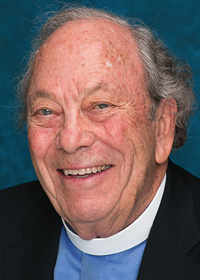
George Regas, pictured in December 2017. Photo: Cam Sanders
The Rev. Canon Dr. George F. Regas – whose bold leadership advanced civil rights, women’s ordination, LGBTQ marriage equality, and reversing the arms race – died Jan. 3 in Pasadena, Calif., where he was rector of All Saints Episcopal Church from 1967 to 1995. He was 90.
Mary, his wife of nearly 44 years, and her son, Lowry Smith, were at Regas’s side when he succumbed peacefully this morning at their Pasadena home. He was receiving hospice care after a brief hospitalization due to an infection that was not coronavirus amid the pandemic’s current surge. Regas is also survived by his daughter Susan Regas, his sons Tim and Tyler, by Mary’s son Burke Smith, and their families. Regas’s daughter Michelle Regas Worrel died in 2002.
Current plans are to offer a celebration of life in Regas’s memory after pandemic restrictions are lifted.
The Rt. Rev. John Harvey Taylor, bishop of the six-county Episcopal Diocese of Los Angeles, said today of Regas: “One of George’s longtime colleagues put it best when she told me that on Sunday morning, he’d be in the pulpit at All Saints, raising the roof for peace in Vietnam and Iraq and equity for women and LGBTQ+ people. Then on Sunday afternoon, you’d see him at Huntington Hospital, reading psalms at the bedside of a seemingly unconscious patient in the ICU.
“As prophet and pastor, he was the complete priest. His exuberance and joy made his faith contagious, building up the church and making it better. We’ll miss our colleague terribly and grieve for Mary and their family. And yet we’ll always have him with us.”
The Rev. James M. Lawson Jr. – colleague of the late Rev. Dr. Martin Luther King Jr. and mentor to the late Sen. John Lewis – today told The Episcopal News that Regas “embodied the religion of Jesus and organized it at All Saints Church and in many campaigns for truth and justice.”
A retired longtime senior pastor of Holman United Methodist Church in Los Angeles, Lawson pointed to Regas’s founding in 2001 of Interfaith Communities United for Justice and Peace, and how he helped that coalition “come up with a major mantra: ‘Religion must stop blessing war and violence.’”
The Rev. Canon Dr. Gary R. Hall – dean of Washington National Cathedral from 2012 to 2015 who earlier served with Regas as an associate priest at All Saints, Pasadena – underscored Regas’s gifts for blending local, national, and global aspects of ministry priorities.
“George Regas had perhaps the greatest influence of any church leader on building the Episcopal Church of the 21st century,” Hall told The News. “Not only was he a prophetic voice on many of our key defining issues – war and peace, the ordination of women, the nuclear arms race, AIDS, homelessness, LGBT marriage equality. He was also a passionate advocate for inclusive language, stewardship, and church growth.
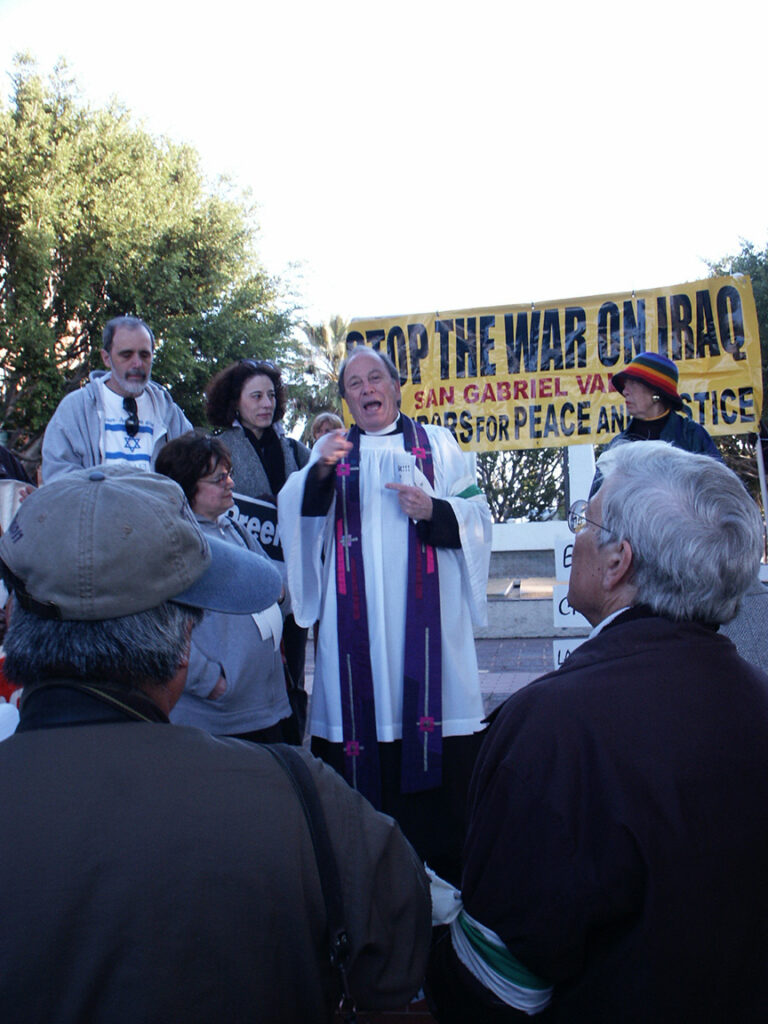
George Regas speaks at an Iraq war protest in 2003.
“George cared deeply not only about how the church faced the world. He also devoted his considerable energy to making the church fiscally strong, liturgically vibrant, and welcoming to everyone,” Hall added. “The church he has left behind today is infinitely stronger than the one he entered mid-century.”
Regas’s role as a leading advocate for the Episcopal Church’s 1976 approval of women’s ordination to the priesthood and episcopacy – for which he worked as a coalition floor manager at that year’s General Convention in Minneapolis – exemplifies the exponential effects of his progressive role. The Rt. Rev. Diane M. Jardine Bruce, bishop suffragan of the Diocese of Los Angeles, told The News today of his encouragement of her candidacy for election in 2009 to serve in ministry with Bishop Diocesan J. Jon Bruno.
“George Regas touched the lives of so many so deeply,” Bruce said. “If it weren’t for his encouragement at just the right moment, I wouldn’t be a bishop suffragan. It was my first of six back-to-back ‘walkabout’ question-and-answer sessions for the search for bishop suffragan,” she added. “I was at the end of my third of four rounds of chemo. I started out by talking about my philosophy on stewardship – one of George’s favorite topics. At the end of that first round with five more to go, I didn’t think I could go on to do more. George came up to me, kissed both my hands and both my cheeks and told me, ‘you are the real deal – keep going.’ I don’t know how he knew that I needed to hear that. If it wasn’t for George Regas, I wouldn’t have gone on that day nor would I have become a bishop. Thank you, George – for the love and support you gave me and so many others.”
Canon Kristi Wallace of Santa Barbara, a past junior warden of All Saints in Pasadena and a former executive director of the diocesan Cathedral Corporation, also underscored the priority that Regas placed upon building and maintaining pastoral relationships.
“There are so many things to love about George, including his refusal to let the many social issues on which he so courageously preached get in the way of his extraordinary pastoral relations,” Wallace told The News today, speaking from family experience at All Saints, where her parents were married and she and her siblings were baptized.
“For instance, he and my father, who had just been George’s senior warden for the second time, had differing views on Caesar Chavez. The week before George’s ‘Farmworkers Sermon,’ he came to visit us. He said, ‘Jack, I don’t want you to feel blindsided by my Sunday sermon. I know I may not see you in the pews for a while, but I won’t ever let you go. I’ll come after you, and I’ll bring you home again.’ And so he did.”
During All Saints’ online services this morning, the Rev. Mike Kinman, rector, informed parishioners of Regas’s death and shared comments from his predecessor, the Rev. J. Edwin Bacon, who followed Regas as rector in 1995.
“As I shared this news with Ed Bacon this morning,” Kinman said in comments posted on Facebook, “Ed commented that this is not only the end of an era for All Saints Church but for American Christianity. He is right, of course. George was one of the giants of the faith.
“And … for us he was so much more. He was a pastor, priest, teacher, father, brother, and friend,” Kinman added. “For many in the All Saints community, George is why they are part of a faith community at all … he made it possible for them to stay, to envision a way of being church that had power and integrity … where you didn’t have to check your brain at the door and where compassion and justice found voice not just in his pulpit, but in all our hearts.”
Many parishioners and visitors have said they were drawn in by Regas’s signature invitation, “Whoever you are, and wherever you find yourself on the journey of faith, you are welcome here to receive the bread and wine made holy.”
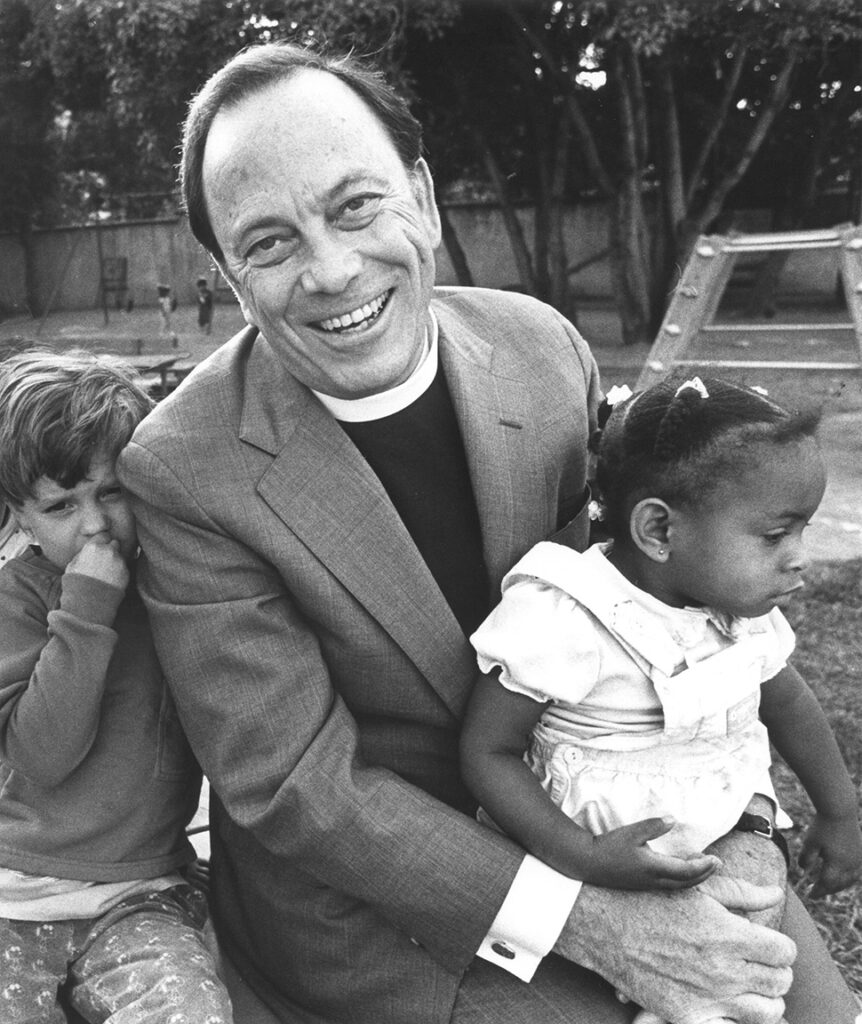
In this undated photo, George Regas visits with children on the playground during his tenure as rector of All Saints Church, Pasadena.
In sermons through the years, Regas also taught the value of relationships by invoking the metaphor of each individual having a balcony filled with loved ones and mentors cheering one along life’s journey. Regas said that being present in the lives and “balconies” of others was among his great privileges.
“The place I’ve loved being the most is not on the protest marches,” Regas said April 30, 1995 in his final sermon as All Saints’ rector, “but with you as you celebrated your marriage and baptized your children; at your bedside when you are told you have cancer; with you when you are grieved with failure and defeat; and beside you when, with crushed hearts, you bury your dead. We have been together in the most glorious of times and the bleakest moments, and we’ve made our way to a trust that nothing can ultimately destroy goodness and love.”
Depths of those relationships were central in greetings that Regas received via online celebrations marking the occasion of his 90th birthday this past Oct. 1. Among well-wishers were Episcopal Church Presiding Bishop Michael Curry and Cape Town’s Archbishop Emeritus Desmond Tutu, who recalled solidarity with Regas in the struggle to end South African apartheid and move forward into new freedoms. During that time Tutu regularly visited All Saints Church and the parish’s Center for South African Ministries.
Other major organizations launched during Regas’s tenure as All Saints rector include Union Station serving Pasadena’s unhoused, the Interfaith Center to Reverse the Arms Race, the All Saints AIDS Service Center, Young and Healthy, and the parish’s Office of Creative Connections, among others. Much of this work is chronicled in a book titled Hearts on Fire: The Evolution of an Urban Church, by the Rev. Bill Lane Doulos. In addition, Regas inspired a generation of young local Episcopalians with monthly rock masses at All Saints in the 1970s.
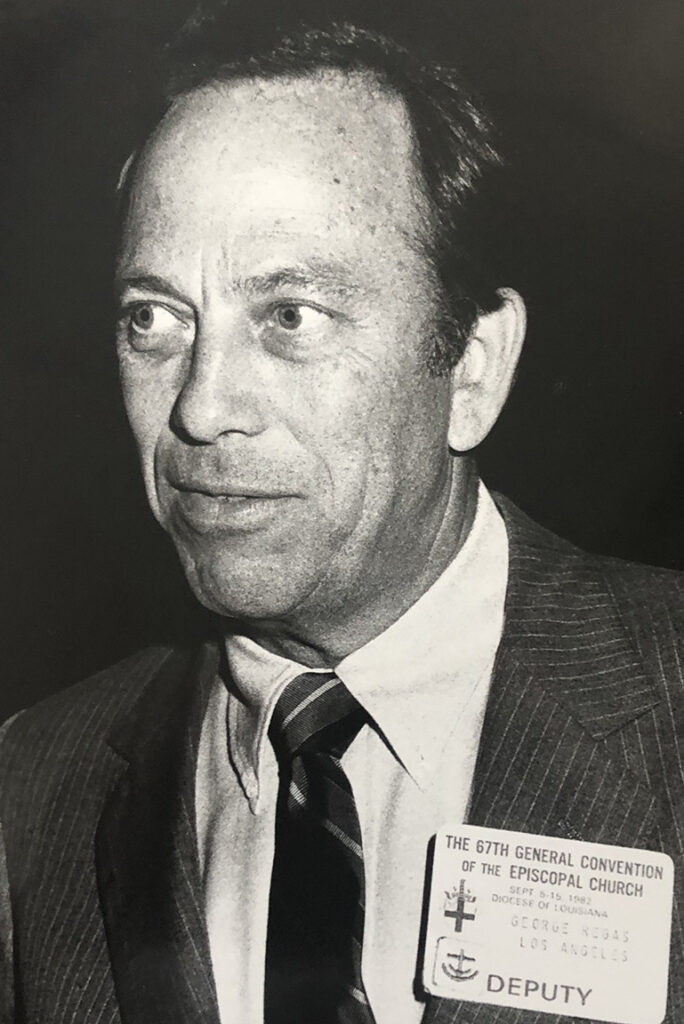
George Regas served as a deputy at the 1982 meeting of General Convention, one of several at which he represented the Diocese of Los Angeles.
“Help us, O Lord, to be masters of ourselves so that we may become the servants of others,” Regas regularly began his resounding sermons that filled All Saints’ 1924 Gothic sanctuary with calls for God’s love in action. His notable 1971 sermon “Mr. President, the Jury Is In!” sought an end to the Vietnam War, and his preaching and sermons in the early 1990s paved the way for the parish’s first blessing of a same-gender union, that of parishioners Mark Benson and Philip Straw, in 1992.
In 1995, around the time of his retirement as All Saints’ rector, Regas reflected on his role as House of Deputies floor manager when the 1976 General Convention authorized women’s ordination. Undaunted by a recent hospitalization for phlebitis, Regas worked from a wheelchair, building a coalition that he traced back to his experience in Los Angeles in 1971 when the diocesan convention resoundingly rejected a resolution calling for the ordination of both women and men. The only priest of the diocese who joined three laywomen to speak in favor of the measure, Regas exhorted the convention toward equity and went on to serve as chair of the diocese’s Commission on Ministry, active from in that role from 1973 to 1980.
Bishop Robert C. Rusack named Regas an honorary canon of the Diocese of Los Angeles in 1980.
Regas mused on the experience of people “whose rigid opposition to the abstract theory of women’s ordination dissolved when faced with the reality of a wonderful and enriching, living, breathing, individual priest who happened to be female.”
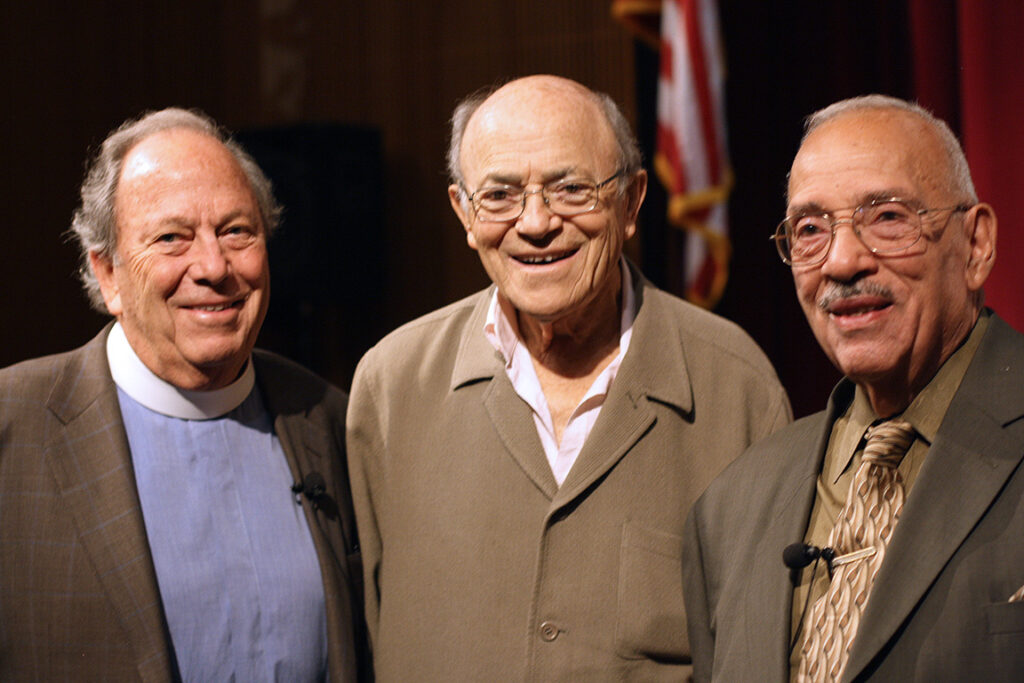
George Regas poses with interfaith partners Leonard Beerman of Leo Baeck Temple in Los Angeles and Maher Hathout, founder of the Islamic Center of Southern California.
At All Saints, Regas was a champion of interfaith relations, and invited Rabbi Leonard Beerman of Leo Baeck Temple in Los Angeles to become All Saints’ rabbi in residence. The two also teamed with Dr. Maher Hathout, founder of the Islamic Center of Southern California, in tri-faith advocacy that included decrying the first Gulf War at its outbreak in 1990 and continued through the decade following the 2001 terrorist attacks.
In the course of his ministry in the wider Episcopal Church, Regas was occasionally asked to consider candidacy for election as a diocesan bishop. In 1988 he was nominated among candidates in the Diocese of New York, but Kansas Bishop Richard Grein was elected.
Exploring topics of self-acceptance and vocation, Regas wrote a book titled Kiss Yourself and Hug the World. After retiring as All Saints’ rector in 1995, he established the Regas Institute as a hub for his ongoing pastoral and social justice ministries. He frequently joined local protests on various issues, continuing to be arrested for civil disobedience as recently as 2011.
George Frank Regas was born October 1, 1930, in Knoxville, Tenn., to Greek immigrant parents. His mother died when he was 5, leaving his father – co-founder of the Regas Restaurant, a Knoxville institution for nine decades – to raise young George and his siblings. In his sermons, Regas at times shared anecdotes of his father’s resilience in keeping the restaurant, established with a brother in 1919, going through the Great Depression and laying the foundation for business enterprises that continued after the restaurant closed in 2010 amid downtown redevelopment and increasing competition.
In his youth, Regas planned to become a medical doctor, but a spiritual epiphany led him to tell his father that he felt more deeply called to help heal people’s souls, leaving others to address physical conditions. Baptized in the Greek Orthodox Church, Regas around age 10 began attending a local Episcopal Church, in part because of the absence of an Orthodox priest in the community.
While attending the University of Tennessee, Regas met Jane Miller, and the couple were married in 1952. Together they moved to Cambridge, Mass., where Regas completed theological studies before being ordained a deacon in 1956 and a priest in 1957.
Following ordination, Regas began two years of graduate studies at England’s Cambridge University, mentored by Anglican Bishop John A. T. Robinson, noted theologian and author of the popular book Honest to God, which took a practical approach to faith. Regas credited Robinson’s friendship and influence with his ongoing studies, which culminated in earning a doctorate in religion conferred in 1972 by the Claremont School of Theology.
The first congregation Regas served was Church of the Messiah in Pulaski, Tenn., a city known as home to an early chapter of white supremacists. In 1960 he was called as rector of Grace Church in Nyack, N.Y., a parish of some 800 members. It was there that Regas – at age 36 – received the call to Pasadena to succeed All Saints rector John Burt, who went on to become bishop of the Diocese of Ohio. All Saints was at the time beginning to experience its growing impact as the largest Episcopal congregation in the western United States.
Regas has spoken of the challenges he faced in his first decade as rector, which included a 1976 fire that destroyed the parish house, as well as the divorce that ended his first marriage. Yet he consistently pointed to the power of faith in transforming crises into avenues to new opportunities.
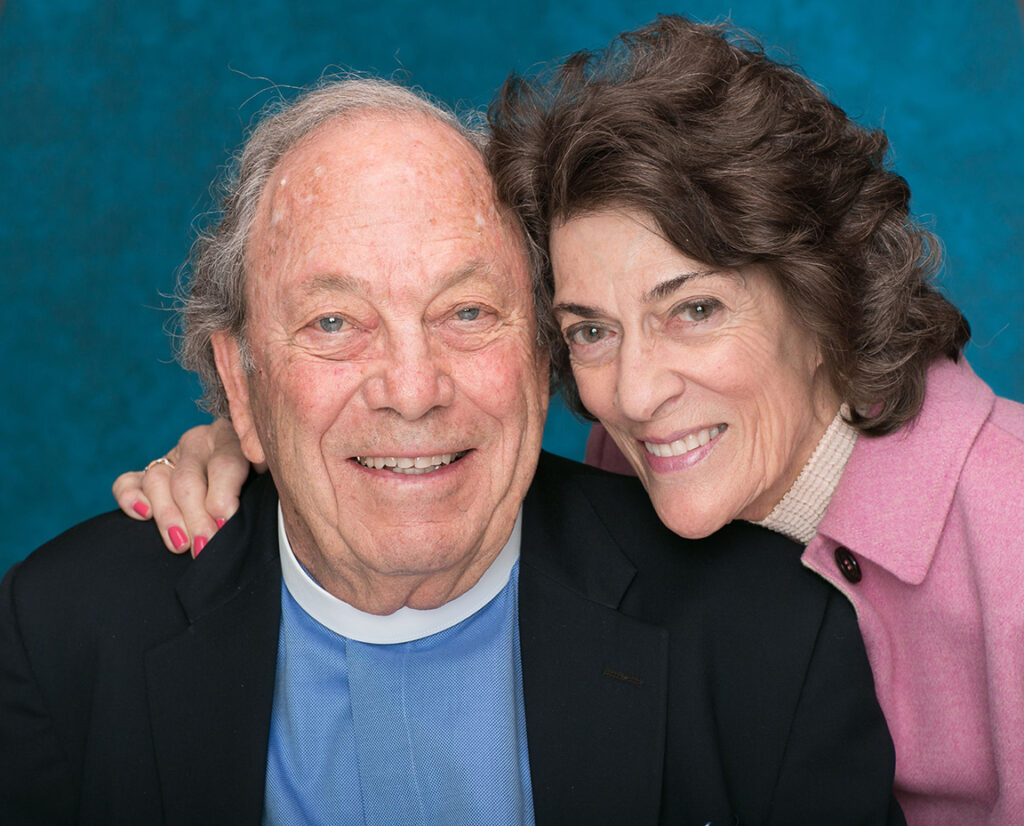
George and Mary Regas, pictured in 2017. Photo: Cam Sanders
One such chapter began in 1977 when he and Mary McCaslin, an accomplished artist well known for her designs of jewelry and for her collections of folk art, were married at All Saints.
A scene well remembered by many All Saints parishioners is that of Mary and George Regas walking lovingly away from the altar at the 1995 outdoor Eucharist marking his retirement.
“What a gift you have given me to trust me with your lives,” Regas said, closing his sermon that morning. “I know now as fully as one could possibly know how greatly loved I am. What a gift. Maybe Sophocles was right: ‘One must wait till the evening to know how splendid the day has been.’”
— Robert Williams is diocesan canon for common life. He was a parishioner of All Saints, Pasadena, from 1984 to 1995.
